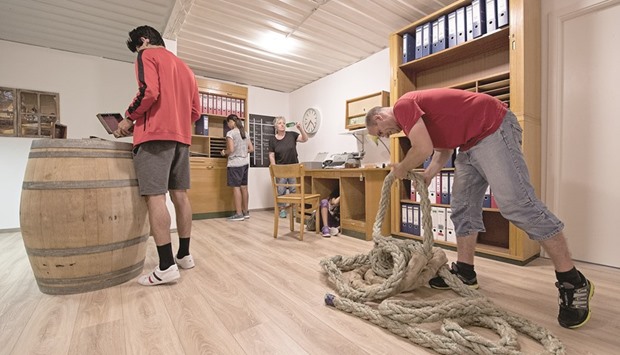
TOUGH NUT: A Swiss family working through the puzzle in an Escape Room in Bremen, Germany. Here visitors have 60 minutes to solve, eg, the Secret of the Harbour Master.
The concept of live Escape Rooms originated in Japan and
spread to Europe. Not just friends and families, even businesses
are taking interest in real-time puzzles.
The door clicks shut. Five employees are locked into the harbour master’s office. He’s suspected of being involved in smuggling. The workers have one hour to poke around in his papers and find the key to unlock the door.
That’s what the Bircher family, holidaymakers from Switzerland, are told before they start playing Team Escape and are shut in the ‘Escape Room’ for 60 minutes. In the office are lots of items which could help the family complete their task: a long rope, a map of the harbour and lots of locked drawers and boxes.
“We divided ourselves up fairly quickly,” says father Daniel Bircher. Each of the five family members looked for clues to help solve the several puzzles which would lead them to the key to the office door.
“The players come out afterwards with bright red faces,” says Henning von Freeden, who runs Team Escape in the city of Bremen, northern Germany. “They’re really pleased.”
The three Escape Rooms he manages opened at the beginning of last year. Up to six people can take part in each game. The idea originated in Japan, and was first copied in Europe in Hungary. “Budapest has the highest density of escape rooms in Europe,” says von Freeden.
Germany now has 450 nationwide, according to the website Live Escape Room Games. Rene Wittek, a psychologist who has tried out lots of Escape Rooms himself, says their success has nothing to do with being locked in a room.
“I think it’s much more about working on a puzzle under time pressure,” he says. The opportunity to play like a child could also be an attraction for some, he adds. “You start to forget what’s around you, you can concentrate on other things.”
Von Freeden, 57, has also tried out several Escape Rooms in Germany and in other European cities. “There are endless possibilities for puzzles,” he says.
He and his team in Bremen developed their puzzles themselves.
The whole process, from the initial idea to the finished room, takes around six months. Each puzzle which helps lead the players to the key has to be well thought out enough that they don’t find it immediately.
The Bircher family escaped just three minutes before their time was up. But they almost didn’t make it, getting stuck on one of the final clues. The so-called game master, who watches everything via a camera, had to give them a nudge in the right direction. While von Freeden has tried to take advantage of Bremen’s history as a port city, other Escape games come up with more scary or bloody scenarios.
In nearby Cuxhaven, an Escape Room opened in July in a former mortuary dating back to 1929. The players have to try and lift a curse cast on a mummy’s treasure, which lies on the seafloor on a sunken ship; if they fail the curse could fall on them, says Guenter Wichert, who runs the game.
And it’s not just families, friends and stag and hen parties who’ve been trying out Escape Room games; businesses have also increasingly shown interest. “The interesting thing is that the game situation and the opportunity to observe people are really good prerequisites for personnel development,” says von Freeden. — DPA
